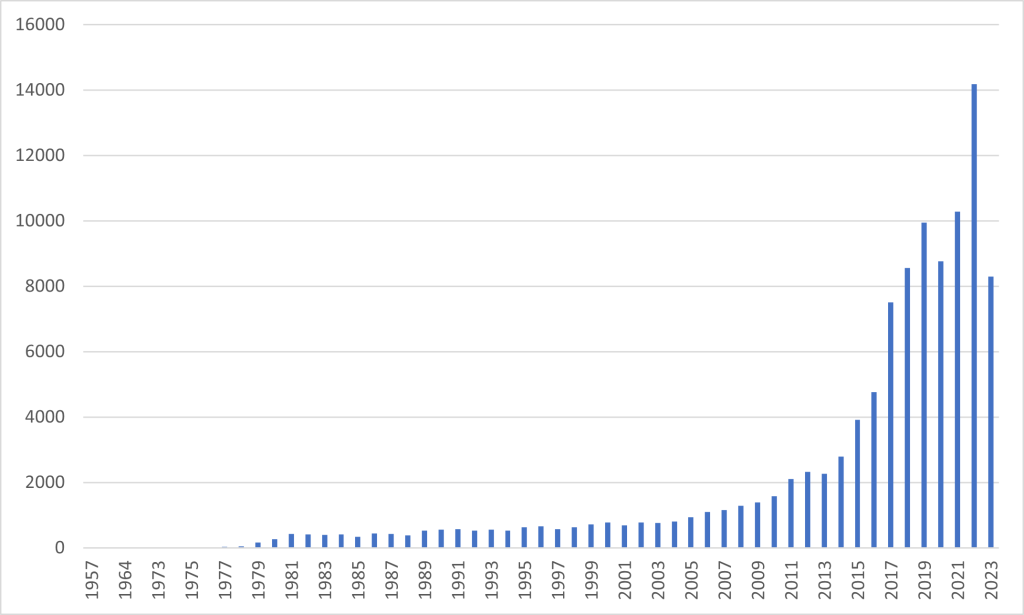Evolution of the Boudreau Burnout Bibliography
From paper to Word to Endnote to Zotero to Definitions
From 1957 to 2005, over 10,000 reference citations were identified in separate paper bibliographies on burnout (i.e., Perlman & Hartman, 1982; Kleiber & Enzmann, 1990; Lubin, Robinson, & Sailors, 1992; Boudreau & Nakashima, 2002; Boudreau, 2005) further reinforcing its importance. These were organized into Word files.
Building on these early efforts and in an attempt to consolidate what we know about burnout, we developed a single, comprehensive bibliographic source using different versions of Endnote software (i.e., up to 20). And most recently, we have transferred the entire contents of the Boudreau Burnout Bibliography into a Zotero library as an open-source resource.
Our Bibliography has been created from historical documents, previously published and unpublished bibliographies, active/inactive databases and distinct providers. The Bibliography covers the period 1957 to 2023, for references and abstracts in published, unpublished, and presentation forms across a wide variety of sources (e.g., journal articles, newspapers, theses/dissertations).
In order for a citation to be included in the Bibliography several key strategies guided the reference search process: 1) the word burnout or one of its related forms (e.g., burnt out, emotional exhaustion) must appear in the abstract or title. For definitional purposes, burnout refers to the occupational, emotional, or psychological phenomenon often characterized by emotional exhaustion, depersonalization, low personal accomplishment, negativism, or cynicism. 2) Citations that reported measuring some element of burnout were included whereas citations that merely use burnout to introduce a different topic were not included. 3) Citations in any language were included.
From 2002 to 2023
As part of its evolution across decades, continually updated versions of the Bibliography were presented at different conferences, globally (e.g., Boudreau & Nakashima, 2002; Boudreau & Boudreau, 2009; Boudreau & Boudreau, 2011; Boudreau, Boudreau, & Mauthe-Kaddoura, 2012; Boudreau, Boudreau, & Mauthe-Kaddoura, 2015; Mauthe-Kaddoura & Boudreau, 2019; Boudreau, Boudreau, & Mauthe, 2021).
Reference Counts x 67 Years
To date, a comprehensive Zotero catalogue totaling 107,159 burnout references from 1957 to 2023 has been created. Numbers approaching 50 Providers (e.g., CSA ILLUMINA, EBSCO, GALE, & ProQuest) and 200 Databases, along with bibliographies and selected tertiary references were used in the development of the Boudreau Burnout Bibliography (see the Appendix for a detailed list of the 15 Bibliographies).

The Boudreau Burnout Bibliography contains abstracts for approximately 51% of the captured reference citations.
Burnout Coverage
In an attempt to measure the validity and “reach” of the Bibliography, two different sets (39 & 13) of review and meta-analysis articles (1993-2014) were examined by independent raters (Kappa Statistic = .96 for both sets/raters). The results indicate that 95.6% of all of the relevant references in the sample of 52 burnout review articles are in the current version of the Boudreau Burnout Bibliography. These findings (Boudreau, Boudreau, & Mauthe-Kaddoura, 2012, 2015) reinforce the position that the Bibliography described herein is reliable, valid, and mostly complete in its coverage. Started another way, we believe that the Boudreau Burnout Bibliography includes over 90% of relevant burnout references in a given year, over the last 67 years.
The Bibliography covers 67 years of burnout references and abstracts in published, unpublished, and presentation forms across a plethora of sources, including:
- Journal Articles
- Dissertations & Theses
- Conference Papers & Proceedings
- Books
- Magazines
- Newspapers
- Web Pages
- Audio-Visual Materials
- Trade Publications
- Technical Reports
- Unpublished Works
- Encyclopedic Entries
- Films
- Government Documents
- eBriefs
Authors’ Note:
The current Bibliography does not include podcasts and webinars. But future versions of the Bibliography may want to include these sources as their popularity grows.
Started another way, we believe that the Boudreau Burnout Bibliography includes over 90% of relevant burnout references in a given year, over the last 67 years.
Selected Findings
The Bibliography of burnout citations in the EndNote 20 format is searchable using many different fields including title, year, occupation, author, keyword (e.g., measure, country) and source type.
Here are some of the more consistent findings identified and presented at conferences over the years:
- 64% of the Bibliography references are journal articles.
- Top 5 burnout journals are: International Journal of Psychology, Occupational Health, Journal of Advanced Nursing, Nursing Management, and Psychological Reports.
- The Maslach Burnout Inventory (MBI) is the most used burnout measure in research.
- Wilmar Schaufeli is the most prolific burnout author.
- Teacher, Nurse, & Doctor are the most burned-out occupations studied.
- 124 countries are represented in the burnout literature.
The Boudreau Burnout Bibliography Advantage
In toto, if you are interested in burnout, the Boudreau Burnout Bibliography is the single, most important resource to consider.
When compared with other available individual databases, providers, and/or other bibliographies, the Boudreau Burnout Bibliography, is arguably the best choice—It is the most comprehensive, up-to-date, easy-to-use, open-source collection of all things, “burnout.”
Whether you are a global researcher using meta-analysis and social network techniques to describe future burnout trends, an undergraduate or graduate student doing a literature search on work health and burnout for a grant application, or a practitioner trying to figure out the best individual and organizational strategies for coping with occupational stress and burnout, our Bibliography is the best place to start your search process. It may also turn out to be the only resource you need to answer your “burning” questions.
The Boudreau Burnout Bibliography (BBB) is available in the Zotero (https://www.zotero.org) format at the following link:
The Boudreau Burnout Bibliography.
Please note: The burnout bibliography database is large and may take up to a minute to load. Thank you for your patience.

